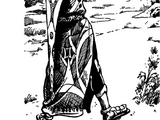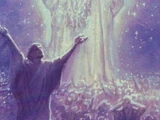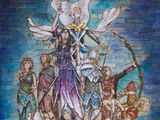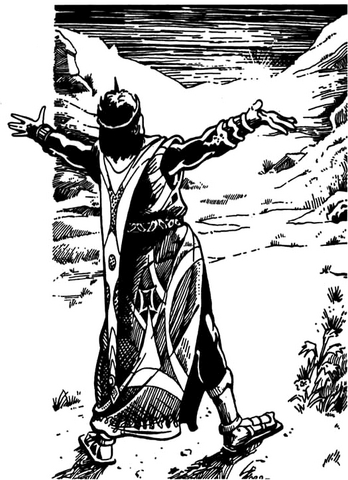
The King of Númenór at Meneltarma
Religion in Middle-Earth was, for the most part, rather informal and unobtrusive.
Most Religious beliefs in the world of Ambar fell into one of three categories: Eruist belief, Dark Worship or superstitious Cults.
See:
Eruist Religion
Eruist Belief (Q. "Eruaistale") was the religion of Eru Illuvatar as it was teached to Elves by the Valar and to men by the Elves. Eruist religions venerated Eru as he one true god and creator of all while the Valar were merely seen as Angelic powers and removed guardians of the World. Eruist Religion tended to be centered around personal faith. There was no official clergy or priesthood, most rituals were held in private and were simple and unpretentious. Eru was almost never directly called upon but rather seen as a removed god who usually did not interfere with the world.However some Eldar and men also believed in the Vision of Finrod and the Old Hope that Eru himself would one day incarnate in Eruhin shape (as "Elpino") in the very world of Arda.
See:
Dark Worship
The Dark worship (Q. "Moriaistale" S. "Dungortist") was the twisted worship and idolatry of the Dark Lord as a deity. The Dark Clergy politically controlled fallen realms and bloody sacrifices, temples and human sacrifices were common.
See:Dark Worship
Superstitious Cults
Superstitious cults (Q. "Kordonisse" S. "Gortis") referred to the simple tribal religions of the lesser men.Many of these Cults were influenced in one or another way by both Eruist religion and the Dark worship, but had developed into bastardized creeds.Often the various Valar and Maiar were treated as pagan deities and developed into confused concepts and myths.These Cults could be urban or rural, temples, sanctuaries and priesthood might be common or cults and rites were performed by elders, chieftains or shamanic figures.
Religion of the Elves
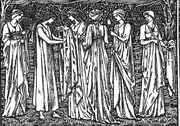
The Eldar had encountered the Valar and regarded Illuvatar as the only true god and creator of all, but they did not devise elaborate ceremonies or temples to worship him. Instead, they installed secular Orders or Guilds to the service of the Valar,his angelic representatives, but the members of these fraternities saw themselves as servants and scholars rather than priests.
The Avari had heard rumors of the Valar and Eru, and some of their elders had encountered Araw and Morgoth, but they largely despised any cults and religion and stayed away from religious reverence of any greater power, though some revered the World itself and the Stars, the Moon and the Sky.
Religion of the Dwarves
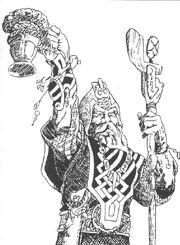
The Dwarves followed similar religious thoughts. They also revered Eru in a rather informal way, but for the most part, they did not pay much attention to the Valar - with the exception of Mahal, their maker. They however added a worldly reverence to their ancestors and their dead forefathers (but especially the Seven Fathers) to their spiritual life.
Religion of the Halflings
The Hobbits and other Halflings had heard about the Powers of the West and the One (whom they called by the moniker "The Authorities"), but did not pay much attention to them. They turned religious holidays and feasts largely into worldly events of joy and social gathering and only old names of days or months (Rethe, Astron, Halimath , Blotmath or Highday) bore remembrance that they had once been the times of religious ritual.
Religion of the Orcs
The Orcs were, for the most part, not interested in religion or cults, From the beginning, however, the Dark Lords had demanded god-like reverence from their slaves which had led to some rudimentary and superstitious demon-worship and affinity to Sorcery and Necromancy among some tribes. But in general, orcish society was primitive, brutal and selfish and had not much room for spirituality with the exception of a few power-hungry Sorcerers who sought to aid the Dark Lords in hope to gain might and influence for themselves.
Religion among Men
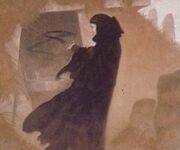
Many mannish peoples had preserved memories from the First Age, legends about a Voice and a mighty Man, a first temple and various Spirits and Demons. Additionally, some early mannish tribes had been pupils of Avari and Orcs, and had learned rumors about the Powers of the West. This had led to some superstitious ideas and cults among the early Men, many of which prevailed among the Wild Men of the East and the South.
In the West, the Edain had encountered the Eldar and learned from them about Illuvatar and the Valar. Their Númenórean descendants turned the reverence of Illuvatar into a religion with their King as their high-priest and the Meneltarma as their sanctuary. When Sauron was taken captive to Númenór, he infiltrated the thoughts of the Kings of Númenór and spawned a dark cult of Melkor-worship with a dark temple on Númenór.

After the Fall of Númenór, the Elendili and Black Númenórean survivors carried on imitations of both Valarin or Eruist and Dark Worship in their realms, and found many imitators and followers among the Lesser Men and Middle-Men. The neighbors and denizens of the Kingdoms of Arnor, Gondor and the Black Númenórean Domains added the religious lore of their new Masters and allies to their own, which led to a number of superstitious ideas. In the Westlands, religion remained largely informal, but in Harad many idol-worshiping sects emerged. The Men of the East continued their own primitive spirit-worship and remnants of the old Dark Worship, but also added a kind of nature-worship, which included indistinct memories of the Entwives who had taught their forefathers agriculture and various magical cults and arcane traditions which were brought to the East and South by the adepts of the Ithryn Luin.
Daen Religion
Deities:
- Avanc-gwirod
- Banseech
- Beynshea
- Dark One
- Duram
- Earth Mother
- Earth Mistress
- Eremi
- Ezande
- Fer Craich
- Five Sisters
- Fois
- Gaoth
- Gawalos
- Gealach
- Gobha
- Grian
- Iroi
- Jevinne
- Mairb
- Marec
- Master of the Hunt
- Montia
- Nainden
- Nezea
- Old Man of the Butte
- Old Man of the Mountains
- Shoglic
- Spirits of the Night
- Stalan
- Tica
- Tulwulh-gwirod
- Turaigh
- Turch-gwirod
- Uch-gwirod
- Wandia
- Yevan
Groups:
Drûghu Spirits
- Aru-Baito
- Balûk
- Chailûza
- Chefuidocsuma Tunkadur
- Hika
- Kâi
- Mâm-ugi-Mâm
- Mori-Kam
- Onak-Ji
- Shin-Ko
- Sûzush
- Uro-Lôk
Eriadorian Gods
Forodwaith Gods
Northron Religion
Deities:
- Afodfréa
- Agendfrea ealra waetera
- Ailgra
- Baumo
- Baumya
- Béma
- Blostma
- Ealwaeter-frea
- Garsecges frea
- The Great Bear
- Lord of the Winds
- Master of the Hunt
- Nefrea
- Neoaerna hlaford
- Neorth
- Sanor
- Uerda
- Urdur
- Vaxa
- Witogoda
Groups:
Easterling Religion
Deities:
- Allanda
- Aldena
- Amnac
- Arawanez
- Ariaana
- Arud
- Ash'val
- Aztar
- Banodos-damu
- Barenda
- Davix
- Dianti
- Donu
- Dragon of Knowledge
- Dulungaz
- Eagle-King
- Earth-Mistress
- Ezran
- Gaath
- Glauren-Erom
- the Great Shaker
- Hakima
- Hur-Iriga
- Illila
- Joghul
- Kadena
- Kaishnalai
- Keo
- Kerkassk
- Khûdriag-Ata
- Kol
- Kondrí Odhí
- Kor-Sharhaigun
- Lilra
- Lord of the Winds
- Mahlic
- Maladûm
- Mambaug
- Mestri din Lioa
- Mestri din Tilmenas
- Milidexter
- Montia
- Numa
- Odanal
- Pael
- Phaon
- Rakana-Kiral
- Sanor
- Shining Hionvar
- S'Sorr
- Sûr
- Traitorous Hunter
- Tûmrakhí
- Uldona
- Uruboz
- Utha
- Vadan
- Valkir
- Waerez
- Xayal Zangin
- Yugal
- Zalam Atash
- Zojan
Groups:
Haradrim Religion
Deities:
- Alavo
- Aluva
- Amaav
- Anorel
- Ardi
- Ardo
- Aritan
- Arizul
- Arom
- Arome
- Ascuru Hudari
- Azain
- Bozisha
- Casu-sadu
- Cubuwa
- The Dark Overlord
- Elenala
- Ganiraib
- Garauda
- Hathor
- The Horned Serpent
- Ishtra
- Junast
- Katamaji
- Kesht
- Kessem
- Khäz-gramaze
- Kojomo
- Kutamaji
- Ladnoca
- L´arkarun-i-masra
- Lilis
- Mahel
- Makusset
- Malikiam
- Malkôra
- Master of Sands
- Meklak
- Mûmathûmûr
- Nadi-Manje
- The Ocean Sunfish
- Rasayn
- Ráskara
- Ringed Serpent
- Ro
- Roho
- Sainausta
- Sanbaiz
- The Sea-Serpent
- Taimaraud
- Talmorng
- Tarbarûn
- Tarkarun-i-masra
- Tera-vel
- Tûlimi
- Valya-Vekte
- Vatra
- Yesuchi
Groups:
All items (204)

